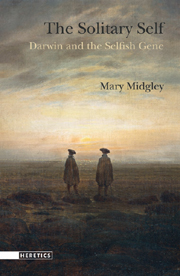Book contents
Introduction
Summary
On being social
The topic of this book is individualism. It starts from a discussion of Darwin because he is now widely credited – or blamed – as the source of the strange, drastic form of individualism that is current today. He did not actually invent that doctrine. In fact, his views about human relations were quite contrary to it. They centred on the natural, human affections and fears that bind us together, on the conflicts that arise among those natural feelings and on the ways in which we try to arbitrate these conflicts. More than many thinkers, Darwin fully recognized the crucial importance of conflict in our lives. And this makes his views much more realistic, and so more interesting, than the simple current dogmas of neo-Darwinism.
It seems worth while to get the record straight about this because Darwin's authority and influence, which are now considerable, should not be used to back views that are not his. Besides that, however, the whole topic is central to us now because individualism is giving us real difficulties today. Although it is a guiding ideal for our age, accepted as a main achievement of the Enlightenment, it takes many different forms. In a general way we take it to be the saving sense that people are distinct from one another and must all be considered separately. And in practical politics we often try to get them this kind of freedom.
- Type
- Chapter
- Information
- The Solitary SelfDarwin and the Selfish Gene, pp. 1 - 14Publisher: Acumen PublishingPrint publication year: 2010
- 1
- Cited by



